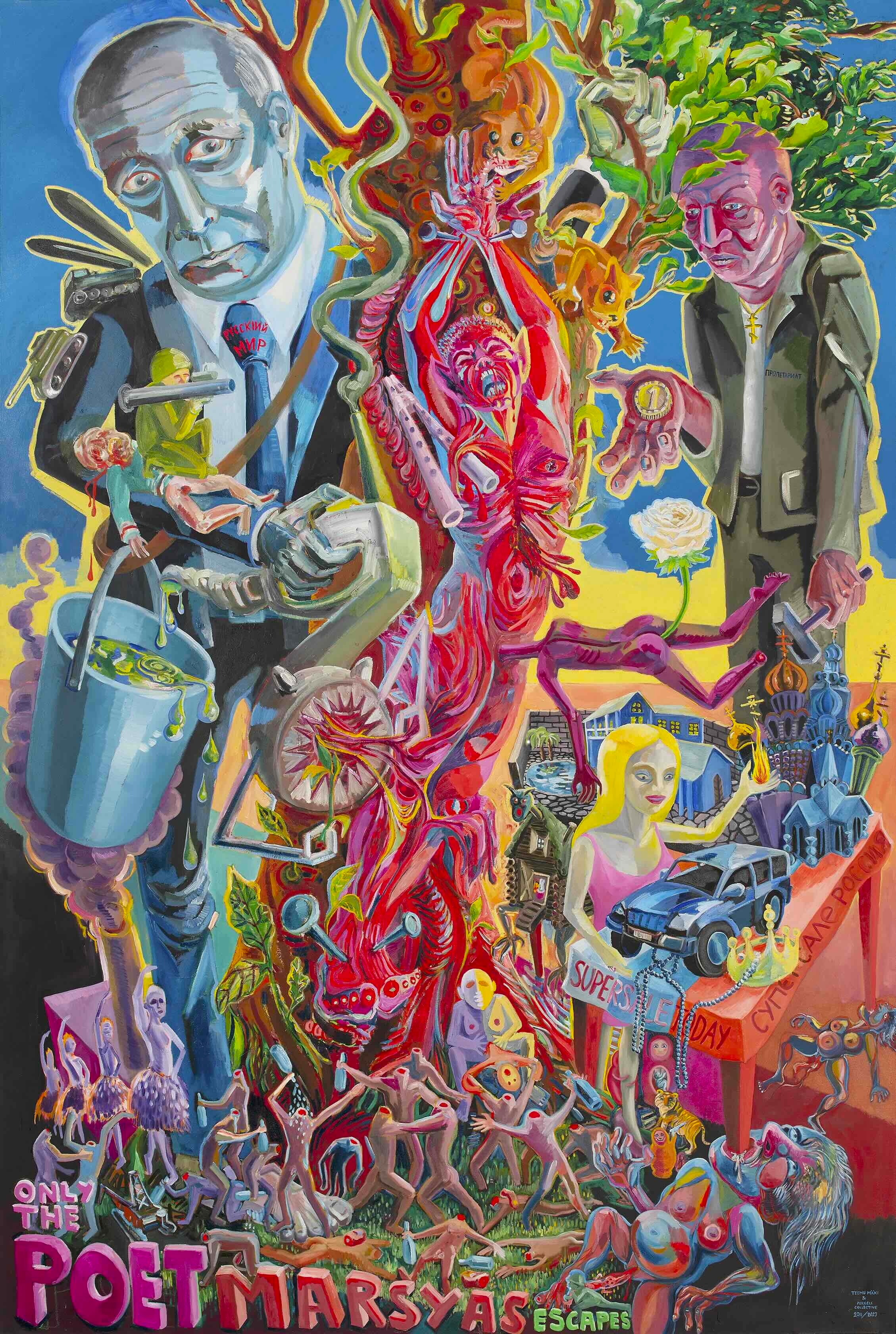
Marsyas
(Only the Poet Marsyas Escapes)
An extract from the multipartite Do You Remember Chechnya?.
First exhibited in 2023.
Teemu Mäki
&
Teo Ala-Ruona, Elisabeth Buzet, Sanna Halme, Hanna Peräkylä, Matti Vainio.
2011 / 2023. Oil on canvas. 300 x 200 cm.
| Marsyas is a character in ancient Greek (and Roman)
mythology. He is one of the satyrs, spirits of nature. Satyrs have ears
that resemble ears of a horse, sometimes also hooves, and a permanent
erection. Satyrs are companions of Dionysos. Dionysos — Bacchus in the
Roman mythology — is the god of grape harvest, wine, fertility, ecstasy
and theatre. Marsyas finds a flute that god Athene has thrown away. It’s a double reed called aulos and Marsyas learns to play it superbly. He is so bold that he dares to challenge someone above him, the god Apollon, into a musical contest. Apollon (Apollo, in roman mythology) plays the lyre and is the master in it. They both play really well in the competition: Marsyas enchants the audience with his intoxicating, frenzied music, while Apollo’s music is full of harmonious beauty. However, in the end Apollon wins. Why? In some versions of the tale he wins simply because he is a bod and Marsyas is beneath him, a mere natural spirit or goblin of the forest. But there are also other versions of the tale and in some of those Marsyas is about to win the contest, but then Apollon resorts to some unfair trick. Apollon may for example in addition to playing start to sing and Marsyas doesn’t have that skill. or Apollon may play the lyre upside down and with this unmusical trick he wins over the audience — especially since Marsyas cannot respond, since the flute can’t be played backwards. All the versions of the tale end the same way. After winning the contest Apollon ties Marsyas to a tree and flays him and hangs his skin from a branch of a tree. What is the metaphorical meaning of the tale? There are many interpretations. At one end there are those, according to which the story of Marsyas teaches that it’s dangerous to challenge those in power — and if you do, then it’s quite right that you’ll be skinned alive. Thus, Marsyas is an example of hubris, thinking way too highly of oneself. The story of Marsyas has been interpreted also in the opposite way. Marsyas is an admirably brave and free being, who takes an instrument thrown away by one god, learns by himself to play it beautifully, and dares to challenge another god into a musical contest. And even though he loses, he is still an encouraging example: he was able to do incredible things, he enjoyed his life, and maybe next time he also wins — or someone like him will. In this sense he is similar to titan Prometheus, another mythological figure, who stole the fire from the gods and gave it human kind. Prometheus was punished by the gods as severely as Marsyas. But humans did get the fire. Maybe the example of Marsyas feeds us with something equally valuable. In the Hermitage museum in St. Petersburg there are several sculptures from ancient times depicting Marsyas, tied to a tree and flayed. That’s were I got the idea for a painting, where the president of Russia, after elevating himself to that status of emperor or god, oppresses everybody except Marsyas the poet. He ties Marsyas to a tree, skins him, sucks life power from him and then kills. Yet in a way Marsyas manages to escape, because he manages to become a role model to others — you don’t have to surrender, you can fight — and because as a poet he knows how to accept his place in the natural circulation, to embrace the fact that a rose may burst from his corpse. |
Marsyas
(vain runoilija Marsyas pääsee pakoon)
Kuuluu moniosaiseen teokseen Muistatko Tšetšenian?
Ensimmäisen kerran esillä MUISTATKO TŠETŠENIAN? -näyttelyssä 2023.
Teemu Mäki
&
Teo Ala-Ruona, Elisabeth Buzet, Sanna Halme, Hanna Peräkylä, Matti Vainio.
2011 / 2023. Öljy kankaalle. 300 x 200 cm.
| Marsyas on eräs henkilö
antiikin Kreikan (ja Rooman) mytologiassa. Hän kuuluu satyyreihin, eli
luonnonhenkiin. Satyyreilla on hevosenkorvat, joskus myös kaviot, ja
pysyvä erektio. Satyyrit ovat Dionysoksen seuralaisia. Dionysos —
roomalaisessa mytologiassa Bacchus — on elonkorjuun, viinin,
hedelmällisyyden, hurmion ja teatterin jumala. Marsyas löytää Athene-jumalan hylkäämän huilun. Se on kaksiputkinen aulos ja Marsyas opettelee soittamaan sitä taitavasti. Marsyas on niin rohkea, että hän uskaltaa haastaa itseään ylemmän, eli Apollon-jumalan soittokilpailuun kanssaan. Apollon (roomalaisten Apollo), on lyyransoiton mestari. Molemmat soittavat kilpailussa upeasti: Marsyaksen soitto lumoaa juovuttavalla kiihkollaan, Apollon soitto sopusuhtaisella kauneudellaan. Apollon kuitenkin voittaa. Miksi? Tarinan joissakin versioissa ihan vain sen vuoksi, että hän on jumala ja Marsyas häntä alempi, pelkkä luonnonhenki tai metsänpeikko. Tarinasta on kuitenkin myös sellaisia versioita, joissa Marsyas meinaa voittaa, kunnes Apollon turvautuu johonkin epäreiluun keinoon. Apollon alkaa vaikkapa soittamisen lisäksi laulaa, mitä Marsyas ei osaa, ja vie siksi voiton. Tai Apollon alkaa soittaa lyyraansa ylösalaisin ja voittaa tällä epämusikaalisella tempullaan yleisön — varsinkin kun Marsyas ei pysty siihen vastaamaan, sillä huilua ei voi soittaa takaperin. Tarinan kaikki versiot päättyvät samoin. Voitettuaan musakilpailun Apollon sitoo Marsyaksen puuhun, nylkee hänet ja ripustaa hänen nahkansa puun oksalle. Mikä on tarinan vertauskuvallinen merkitys? Tulkintoja on monia. Yhdessä ääripäässä ovat ne, joiden mukaan Marsyaksen tarina opettaa, että on vaarallista haastaa vallanpitäjiä — ja jos haastaa, niin silloin kuuluukin tulla elävältä nyljetyksi. Marsyas on näin esimerkki hybriksestä, eli siitä että luulee aivan liikoja itsestään. Marsyaksen tarinaa on tulkittu myös päinvastaisella tavalla. Marsyas on ihailtavan rohkea ja vapaa olento, joka ottaa yhden jumalan hylkäämän instrumentin, opettelee soittamaan sitä hienosti, ja uskaltaa haastaa toisen jumalan soittokilpailuun. Vaikka hän häviää, hän on silti rohkaiseva esimerkki: hän pystyi ihmeellisiin tekoihin, nautti elämästään, ja ehkä hän seuraavalla kerralla myös voittaa — tai joku hänen kaltaisensa voittaa. Tässä mielessä hän muistuttaa titaani Prometeusta, erästä toista mytologista hahmoa, joka varasti tulen jumalilta ja antoi sen ihmisille. Jumalat rankaisivat Prometeusta yhtä ankarasti kuin Marsyasta. Mutta ihmiset saivat tulen. Ehkä Marsyaksen esimerkki ruokkii meitä jollain yhtä arvokkaalla. Taidemuseo Eremitaasissa, Pietarissa, on useita antiikin ajan patsaita, jotka esittävät Marsyasta, puuhun sidottuna, nyljettävänä. Sain siitä idean maalaukseen, jossa Venäjän presidentti, nostettuaan itsensä suunnilleen keisarin tai jumalan asemaan, alistaa kaikki muut paitsi Marsyas-runoilijan. Marsyaksen hän sitoo puuhun, nylkee, imee tästä elinvoimaa ja sitten tappaa. Marsyas kuitenkin tavallaan pakenee, sillä hän onnistuu näyttämään esimerkkiä muille — ei tarvitse alistua, voi taistella — ja koska hän on runoilija, hän osaa hyväksyä paikkansa luonnon kiertokulussa, sen että hänen raadostaan puhkeaa vaikkapa ruusu. |
